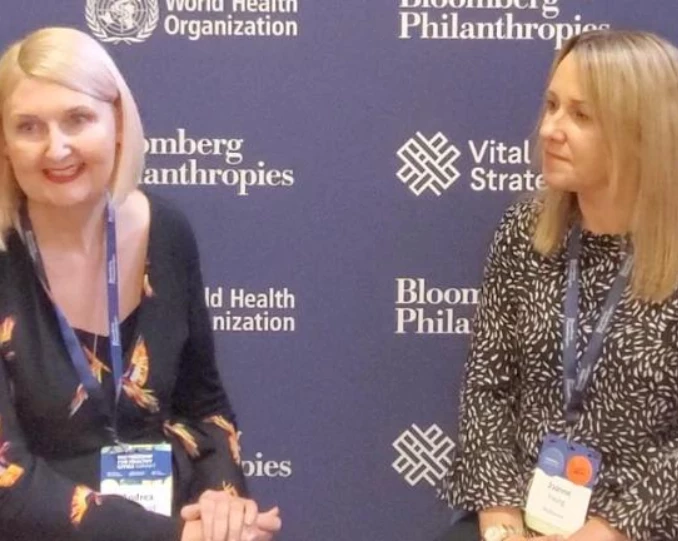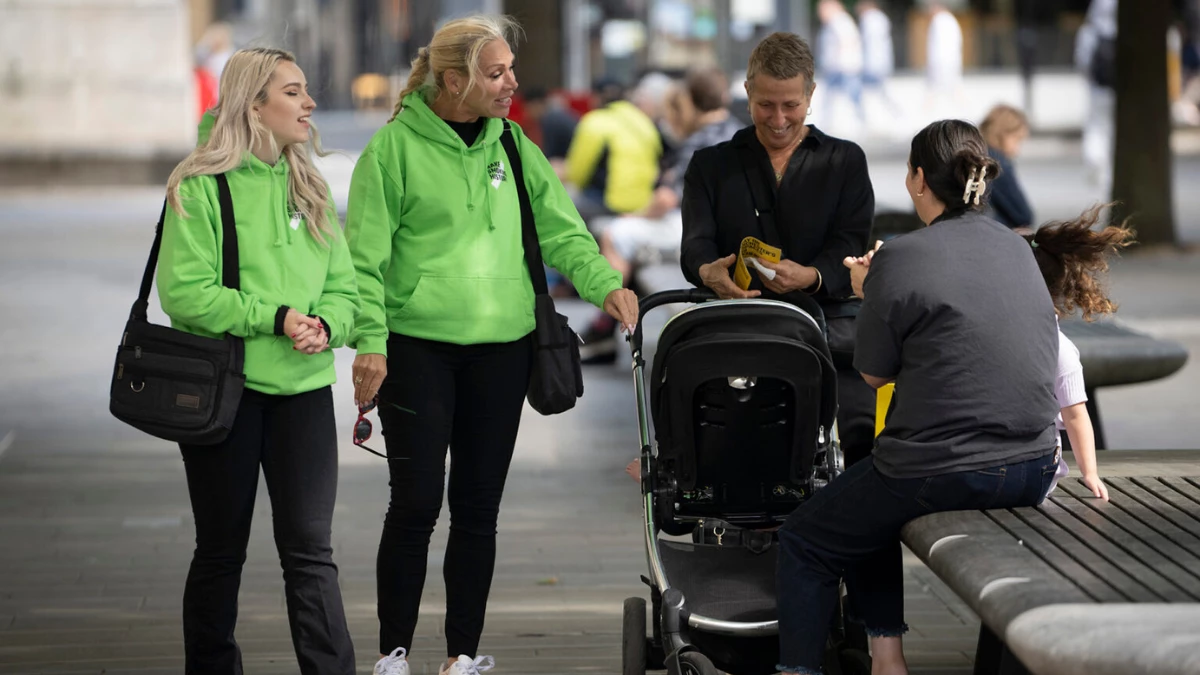Two cities swap strategies on going smoke-free
A conversation with Andrea Crossfield, Greater Manchester (pictured left) and Joanne Young, Melbourne (pictured right).

A World No Tobacco Day dialogue
When Greater Manchester—home to some of the highest smoking rates in England—joined the Partnership for Healthy Cities in 2021, the city region had already achieved significant progress in tackling tobacco use: Smoking prevalence had dropped to the lowest level on record.
Next, four busy downtown hubs were being considered for outdoor smoking bans, and the first step was to invite the residents who use those areas regularly to have their say.

NHS workers launch the “Smoke Free Zone” campaign in St Peters Square, Manchester.
Seventeen thousand miles away, the city of Melbourne, Australia, part of the 70-city Partnership since 2017, was beginning the next phase of its smoke-free journey: A strategic framework for protecting the community from the harms of smoking and vaping had just gone into effect—the first of its kind in any Australian city. The policy had been informed heavily by community and expert input, with 77% of those who took part in the consultation ultimately expressing support.
The parallels between these two cities called for a conversation. That first chat led to more, and then to an in-person meeting in March 2023 at the Partnership for Healthy Cities Summit in London.
That’s where Vital Strategies sat down with the two people leading this dialogue to find out what they’d learned: Andrea Crossfield, Population Health Policy and Strategy Consultant for Greater Manchester, and Joanne Young, Melbourne’s Acting Team Leader of Health Projects. We followed up with both this month by email as Greater Manchester prepared to unveil its first smoke-free green space: Mayfield Park.
Despite very different national contexts—on e-cigarette regulation, prevalence rates and more—the two cities have shown that local action can and should lead the way on public health, using solutions that can be shared across borders.
What strategies for implementing smoke-free outdoor spaces have you both found especially key?
Andrea: We agree on the importance of engaging the public and the whole range of communities from the very outset, how important handling the media is—and to use that to inform your wider stakeholders, including politicians.
Joanne: Both teams know that public buy-in provides us with the support to take these new initiatives to our city councils for endorsement, and that decisions made by local government directly influence the amenities of local areas where people live, work, learn and play.
What are some key differences in the local context?
Joanne: We were surprised to hear about how widely vaping is used and recommended as a cessation tool in Manchester. The public health approach is very different in Melbourne, and Australia more broadly, where the federal government has just announced a ban on vaping.
Andrea: It’s interesting how little formal enforcement of the policy had been necessary in Melbourne and how few fixed penalty notices had been issued. But then our own experience to date in implementing temporary smoke-free spaces and events reinforces our belief that the public enjoy smoke-free spaces, want to protect children from smoking norms and will actively enforce the policy.
Please mention something you picked up from each other during your extended conversation and incorporated (or will incorporate) at home.
Andrea: We loved the citizen engagement panels that Melbourne implemented as part of their consultation to better understand public perceptions. We’d like to commission voluntary sector partners to set up and run residents’ panels in locations surrounding our new smokefree spaces to understand their influence and impact on local individuals and communities, including never smokers, former smokers and smokers.
Joanne: We learned a lot, particularly in terms of the communities with higher smoking rates that Manchester has been able to access, which we were able to take back to Australia. We enjoyed listening to how they described their work with LBGTQ communities.
Smoke-free Melbourne Policy Development that provides a framework to protect our community from the harms of smoking.
What are the next steps for both teams?
Joanne: We are considering new smoke-free areas in Melbourne, as well as communication with target groups that have higher smoking rates, for example, international students. We continue to share knowledge locally with other governments and health promotion organizations. The recent federal government vaping ban supports our work and will assist with reducing access to vaping products in the community. Vaping has had a major impact on the schools in our municipality and we are investigating how we can support them in the future.
Andrea: Greater Manchester city-region is undertaking a review of the current Making Smoking History strategy. This will set the direction for the next five years and incorporate recommendations from a national report that came out last year. The public consultation we did in collaboration with the Partnership for Healthy Cities found that 8 in 10 residents support our local smoke-free strategy—so that will encourage us to work together to deliver more smoke-free spaces over coming years.
This feature was published by Vital Strategies on May 30, 2023.
Find out more
NHS GM as part of Greater Manchester Integrated Care Partnership
Greater Manchester Integrated Care Partnership was set up on 1 July following the passage of the Health and Care Act 2022. The Partnership is made up of local NHS organizations and councils, as well as representatives from NHS England, our emergency services, the voluntary sector, Healthwatch and others including the Mayor of Greater Manchester. It brings together all the different organizations that support people’s health and social care, so that services can join up and act faster when people need support.
City of Melbourne Smoke-free Melbourne Policy
The City of Melbourne has been working on reducing the harms of smoking since 2013 when the first smoke-free area was introduced. This has now expanded to 13 areas across Melbourne’s CBD. As part of the Partnership for Healthy Cities network the city developed a policy in July 2021 to guide the creation of more smoke-free areas, ways to reduce and de-normalize smoking as well as supporting people to quit.
Related

An overview of the the Partnership's tobacco control work.

Learn more about how the city is combating smoking by implementing public health laws.

The ninth WHO report on the global tobacco epidemic tracks the progress made by countries in tobacco control since 2008.